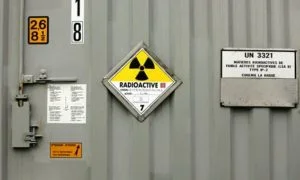Sick Nuclear Weapons Workers Are Entitled to Compensation

Lawyers are using once-classified government documents to argue that potentially thousands of sick nuclear weapons workers and their families should be eligible for federal benefits.
The documents, released late last year, provide evidence that some workers at the Savannah River Site were exposed to thorium after 1972 even though the government said the plant no longer had significant quantities of the radioactive material.
Bob Warren, an attorney representing some victims of this incident, said the federal records show that SRS had ample amounts of thorium, a metal used in nuclear reactions that can cause cancer. Warren obtained the documents under the Freedom of Information Act from the U.S. Department of Energy after a three-year wait.
“Without this information, we would not be able to go forward,’’ Warren said in an interview with The State. “These documents are pivotal in making the case.’’
In a letter to a government radiation advisory board, Warren asks that more people employed at SRS be compensated for illnesses they contracted while working there.
Warren’s request, to be discussed by the advisory board Wednesday, seeks to expand a federal compensation program by making it easier for people who worked at SRS from 1973-2007 to gain benefits for cancer the site caused.
The federal government has already made it easier for many sick workers employed before 1973 at SRS to receive compensation because of likely exposure to thorium at the site.
Those eligible for benefits could get up to $400,000 each under the federal compensation program. The program, available to sick workers at federal weapons complexes across the country, has been criticized as a bureaucratic maze of rules so tough that many deserving people have been denied benefits. Some ex-workers have died before receiving compensation., according to a McClatchy newspapers investigation last year.

“There is no reason not to expand,’’ Warren’s letter said, noting that approving his request would make “many more workers and their survivors eligible for benefits from the … program before they die.’’
Warren said if he is successful, several thousand people who worked at SRS from 1973 to 2007 could receive benefits.
SRS is a 310-square mile federal atomic weapons site near Aiken along the Georgia border. It was a cornerstone of the nation’s Cold War nuclear weapons production effort, at times employing more than 10,000 people. Many who worked there were exposed to radiation, and some now say the exposure made them sick.
Federal officials charged with recommending whether to expand the program are expected to challenge Warren’s arguments at Wednesday’s meeting of the Advisory Board on Radiation and Worker Health. But Warren said it’s hard to dispute what he has found in more than 1,300 pages of records that the government released.
The Evidence
The documents, many of which were previously classified, contradict past federal justification for not expanding the compensation program, he said. The records indicate that thorium existed in notable quantities for years at SRS after 1972 – despite government arguments that it did not.
Among the documents are:
▪ Handwritten records from SRS officials showing that more than 8 tons of thorium were stored at the site in 1998.
▪ A 1982 memo from a ranking SRS official showing that thorium was among the radioactive materials the government wanted to discard.
▪ A 1976 inventory report showing about 7 tons of thorium on the site.
In addition, Warren’s letter to the advisory board uses the deposition of a top site official to show that the government had no bioassay medical screening program for thorium exposure before 2000.
Thorium is used in the aerospace industry and in nuclear reactions. Breathing thorium dust may cause an increased chance of lung disease as well as lung and pancreatic cancer years after being exposed, according to the federal Agency for Toxic Substances and Disease Registry. Thorium, which is odorless and tasteless, also has been linked to bone cancer, the agency reports.
The 1,300 pages released by the government now “definitely show thorium shipments to, and in some cases from, SRS after 1972,’’ Warren’s letter says. In the past, federal health officials charged with giving the advisory board information have not provided documentation that would have helped the board recommend expanding the program to cover more recent years, he said.
The Department of Energy had no immediate comment on the thorium issue. It could be months before Warren’s request is resolved.

The Advisory Board on Radiation and Worker Health, a division of the National Institute for Occupational Safety and Health, would forward any recommendation to the U.S. Secretary of Health and Human Services for a final decision. If the secretary agrees, Congress would have 30 days to veto the designation. Otherwise, the expansion would become effective, a spokesman for the safety and health institute said.
The advisory board meets Wednesday in Idaho to discuss an array of national nuclear health issues, including Warren’s proposal.
What The People Have to Say
“We aren’t in a position to predict when a decision will occur,’’ spokesman Josh Kinman said in an email.
Mitch Still, a South Carolina resident represented by Warren, said he hopes the government expands the compensation program because he continues to deal with costly medical bills. Still was diagnosed with colon cancer and believes his ailment resulted from working at SRS. He was employed at the plant from 1982-91.
Still said he has been denied benefits by the government because he can’t get the records he needs to prove the dose of radiation he received caused his cancer.
“I’m the first in my family to have cancer,’’ said Still, a resident of Clark’s Hill near McCormick. His main concern, he said, is “that they just treat me fairly.’’
Filing for Worker’s Compensation
Under the federal compensation program, employees sickened by numerous types of cancer at SRS and other federal weapons sites must show that the radiation they received was a significant cause of their illnesses. But the government also can declare entire classes of workers as eligible without requiring each worker to document his or her doses. The class designation can occur when individual dosage records are unavailable to workers.
Bioassy records are unavailable for individual workers to show exposure to thorium, and so Warren argues that all workers from 1973-2007 should be eligible for compensation. In 2011, he was successful in persuading the government to make workers prior to 1973 eligible for compensation because of thorium exposure.
Warren’s petition is part of a 14-year-effort to obtain compensation for people who say they were sickened by radiation at SRS. An attorney in Black Mountain, N.C., Warren is one of the few lawyers who took on SRS compensation cases, which do not pay attorneys well. He plans to retire soon because of health problems but he works with South Carolina lawyers Warren Johnson and Joshua Fester, who will continue the work.
Nationally, the government has paid more than $12 billion to sick ex-nuclear workers and their families, including those from SRS, McClatchy newspapers reported last year. The energy employees compensation program began in 2001.






